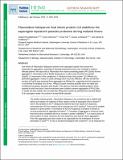Plasmodium falciparum heat shock protein 110 stabilizes the asparagine repeat-rich parasite proteome during malarial fevers
Author(s)
Muralidharan, Vasant; Oksman, Anna; Pal, Priya; Lindquist, Susan; Goldberg, Daniel E.
DownloadLindquist_Plasmodium falciparum.pdf (7.819Mb)
PUBLISHER_POLICY
Publisher Policy
Article is made available in accordance with the publisher's policy and may be subject to US copyright law. Please refer to the publisher's site for terms of use.
Terms of use
Metadata
Show full item recordAbstract
One-fourth of Plasmodium falciparum proteins have asparagine repeats that increase the propensity for aggregation, especially at elevated temperatures that occur routinely in malaria-infected patients. Here we report that a Plasmodium Asn repeat-containing protein (PFI1155w) formed aggregates in mammalian cells at febrile temperatures, as did a yeast Asn/Gln-rich protein (Sup35). Co-expression of the cytoplasmic P. falciparum heat shock protein 110 (PfHsp110c) prevented aggregation. Human or yeast orthologs were much less effective. All-Asn and all-Gln versions of Sup35 were protected from aggregation by PfHsp110c, suggesting that this chaperone is not limited to handling runs of asparagine. PfHsp110c gene-knockout parasites were not viable and conditional knockdown parasites died slowly in the absence of protein-stabilizing ligand. When exposed to brief heat shock, these knockdowns were unable to prevent aggregation of PFI1155w or Sup35 and died rapidly. We conclude that PfHsp110c protects the parasite from harmful effects of its asparagine repeat-rich proteome during febrile episodes.
Date issued
2012-12Department
Massachusetts Institute of Technology. Department of BiologyJournal
Nature Communications
Publisher
Nature Publishing Group
Citation
Muralidharan, Vasant, Anna Oksman, Priya Pal, Susan Lindquist, and Daniel E. Goldberg. “Plasmodium falciparum heat shock protein 110 stabilizes the asparagine repeat-rich parasite proteome during malarial fevers.” Nature Communications 3 (December 18, 2012): 1310.
Version: Author's final manuscript
ISSN
2041-1723